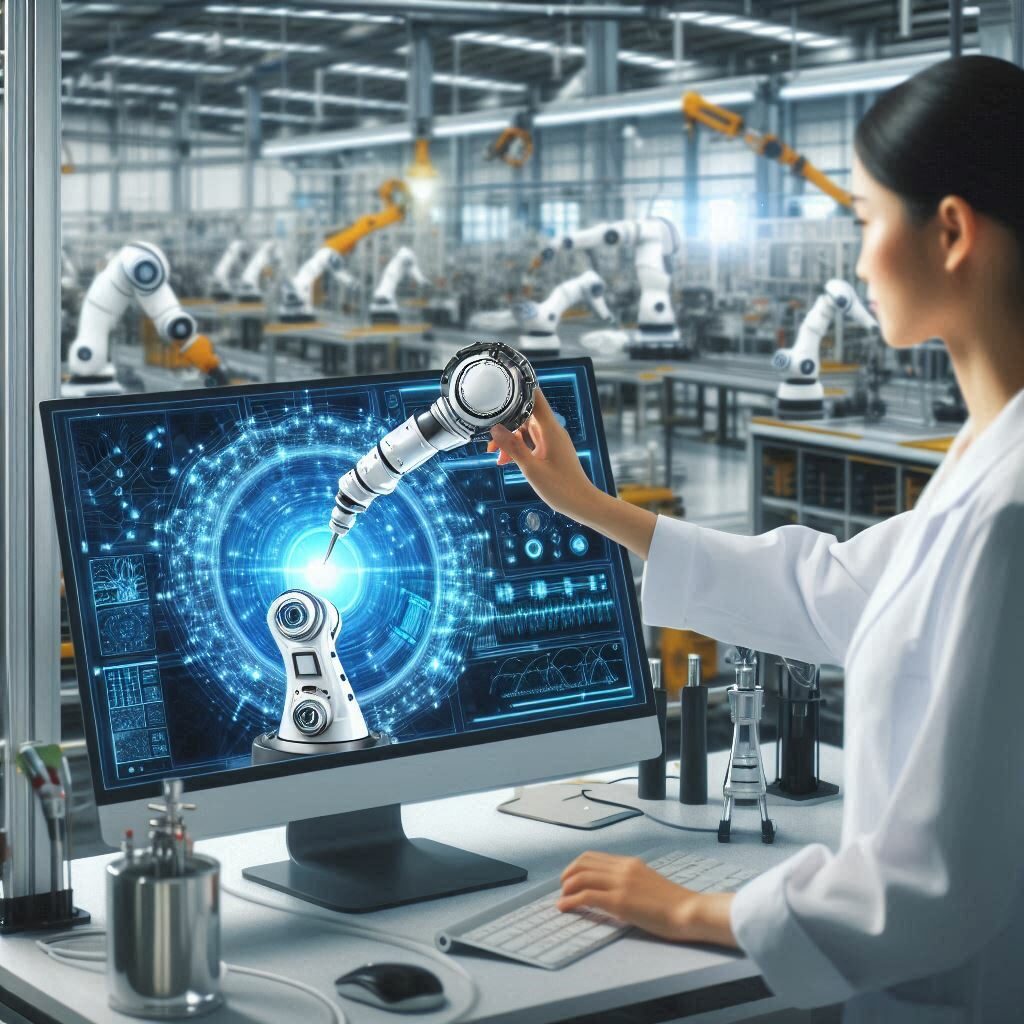By Nishita Verma and S Harish
Introduction
Artificial Intelligence (AI) is revolutionizing industries at an unprecedented pace, and manufacturing is no different. Within the spectrum of AI advancements, Generative AI emerges as a particularly transformative technology, offering substantial potential for the manufacturing sector. This blog will delve into Generative AI, exploring its applications, advantages, and future prospects in manufacturing
Overview of Generative AI in Manufacturing
Artificial Intelligence (AI) has been pivotal in transforming the manufacturing landscape over the past few decades, driving significant productivity enhancements. From early automation technologies in the 20th century to the latest advancements in machine learning, AI continues to shape how manufacturing processes evolve. Within this vast AI landscape, Generative AI stands out as a technology with tremendous potential to redefine manufacturing.
Generative AI encompasses algorithms capable of producing new content, including images, text, and audio. In contrast to conventional AI models that focus on classification or prediction, Generative AI learns the underlying distribution of existing data to create new samples that mimic that data. Tools like ChatGPT, Jasper, and Bard have demonstrated the transformative potential of Generative AI across industries by generating realistic text, images, and videos. Instead of solely relying on pattern recognition, data classification, and analytics like traditional AI, Generative AI excels at creating fresh content, designs, responses, and synthetic data.
The impact of Generative AI has already been felt in healthcare, consulting, and financial services, and its influence is now extending to manufacturing. Its applications in this sector range from product design and innovation to predictive maintenance, quality assurance, supply chain optimization, and process improvement. With such extensive potential, Generative AI is positioned to revolutionize manufacturing.
Generative AI by Modality
Understanding the different types of Generative AI models is crucial for leveraging their full potential. This section will provide insights into various modalities of GenAI models, helping us recognize how each type can address challenges and opportunities across diverse applications. By familiarizing ourselves with these categories, we’ll be better equipped to harness the power of GenAI
GenAI models can be segregated based on modality
- Text: Generate human-like text based on learned patterns from large datasets. Eg. GPT 3.5, Llama-2 etc
- Images: Create, enhance, and manipulate images with high realism or artistic styles. Eg. DALL-E, Stable diffusion etc
- Video: Produce and transform video content to create realistic or imagined animated sequences.
- Audio: Synthesize and manipulate audio, including speech and music, with remarkable realism. Eg VALL-E, Audiocraft, Whisper etc
- Multimodal: Bridge multiple data types to generate cohesive content, blending visual and textual elements seamlessly. Eg. GPT-4, Gemini etc
The Impact of Generative AI on Manufacturing Operations
- Product Design and Development
- Supply chain management
- Sales and marketing
- Distribution
- After Sales service
- Plant Operations
Product Design and Development
Traditional product development often struggles with time-intensive market analysis, inefficient concept generation, and costly prototyping. Generative AI can address these challenges by leveraging market data and customer buying patterns to swiftly generate requirements and concepts, accelerating time to market.
During the product design phase, Generative AI can accelerate design iteration, enabling manufacturers to explore diverse ideas swiftly, all while reducing time and costs associated with the process. Industrial designers, empowered by this technology, can explore a myriad of innovative ideas and product experiences—including previously unimagined ones. For instance, they can input a set of design constraints and let the AI generate multiple viable concepts that meet those constraints, allowing rapid exploration and refinement of novel designs. Generative AI can expedite the development of initial design concepts exponentially faster than traditional methods.
Whether conceptualizing new products or refining existing ones, Generative AI can integrate seamlessly into essential phases of the creative process, from concept development to testing.
Supply Chain Management
Supply chain management is one of the most challenging aspects of modern manufacturing. Production planners and supply chain analysts are required to build comprehensive models that simulate supply and demand while also accounting for unexpected disruptions. Generative AI can enhance this process by enabling endless inventory scenario modeling to optimize both carrying costs and availability. Advanced visual layouts further aid in identifying efficient storage options and alternative inventory designs.
Beyond improving inventory management, Generative AI can act as a strategic supply chain advisor. As manufacturers grapple with long-term supply chain disruptions and the growing importance of ethical sourcing, visibility across the entire supply chain has become paramount. By leveraging natural language processing (NLP), Generative AI can analyze legal and contractual documents to extract key provisions, providing real-time insights into supplier compliance and performance.
In addition, Generative AI can help identify the best-suited suppliers based on specific criteria such as bill of materials (BOM) specifications, raw material availability, delivery schedules, and sustainability metrics. This comprehensive analysis enables supply chain executives to make data-driven decisions, ensuring a responsible and efficient sourcing strategy.
Sales and Marketing
GenAI can reform sales and marketing workflows through its adept utilization of machine learning to analyze customer buying behavior, thereby facilitating targeted strategies in both inbound and outbound marketing communications. GenAI can empower sales teams to enhance lead generation, follow-ups, and conversion rates with tailored pitches. GenAI possesses the capability to produce high-quality content suitable for marketing and SEO purposes. Moreover, it can seamlessly integrate into the follow-up and conversion cycle, deploying smart and efficient AI algorithms to engage with customers through various channels, including phone calls, emails, and social media platforms.
Throughout the sales cycle, from cold calls to closure, GenAI can elevate employee performance by enabling hyper-personalization, and more accurate lead qualification. With the assistance of intelligent copilots, GenAI can efficiently guide sales teams through contract generation and closing processes. The impact of AI, particularly GenAI, resonates across three core areas of marketing and sales: customer experience (CX), growth, and productivity. Through hyper-personalized content and offerings based on individual customer behavior, personas, and purchase history, GenAI can enrich CX.
In terms of growth, GenAI can accelerate top-line performance by providing sales teams with insightful analytics and customer data. Moreover, GenAI can augment sales effectiveness by automating mundane tasks, allowing teams to focus on meaningful interactions with customers. Ultimately, personalization remains paramount, with GenAI enabling companies to deliver targeted marketing and sales offerings tailored to both B2C and B2B customers, thereby fostering stronger customer relationships and driving business success.
Enhancing After-sales
Customer Service Automation
The expectations for aftersales service in manufacturing are continually rising. According to Salesforce, 80% of business buyers expect companies to respond and interact with them in real time, while 82% state that personalized care influences their loyalty.
To meet these high standards, manufacturers are increasingly turning to generative AI to provide a seamless and value-added customer service experience. Generative AI can enhance customer-facing teams by providing intelligent troubleshooting support and contextual knowledge repositories. Natural language models can guide customers through self-service processes, delivering precise and personalized responses while allowing staff to focus on more complex inquiries.
Generative AI can streamline and accelerate resolution times for common customer interactions, such as:
- Product Troubleshooting: Create detailed, step-by-step guides to help customers solve technical problems independently.
- Ordering Replacement Parts: Automate the process of ordering spare parts, ensuring timely delivery and accurate fulfillment.
- Scheduling Service: Enable customers to conveniently book maintenance and repair services.
- Product Information: Provide comprehensive product specifications, documentation, and FAQs in an easily accessible format.
- Product Operation: Generate customized user manuals and tutorials tailored to individual customers.
By automating these tasks and offering personalized customer care, generative AI not only improves customer satisfaction but also enhances staff productivity, resulting in faster issue resolution and stronger customer loyalty.
Benefits and Challenges
The adoption of GenAI in manufacturing offers significant benefits, including increased efficiency, cost reduction, enhanced innovation, streamlined production processes, and minimized downtime. However, integrating GenAI comes with challenges such as ethical considerations, data privacy, security, and potential job implications. Manufacturers need to carefully balance the benefits and risks of GenAI to optimize factory processes and stay competitive in the evolving market.

The Future of GenAI in Manufacturing
The future impact of GenAI on manufacturing is immense, promising to smoothen production flows, predict equipment failures, monitor quality, and provide custom experiences for buyers. As GenAI evolves, it will be increasingly integrated into different parts of manufacturing, driving efficiency, productivity, and innovation across the industry.
Conclusion
In conclusion, the integration of generative AI into plant operations presents a transformative opportunity to enhance efficiency, safety, and decision-making processes. While this overview highlights the potential benefits and applications, a deeper exploration is warranted to fully grasp the impact of this technology. Therefore, we will delve into the specific roles and implications of Generative AI in Plant Operations separately in Part 2 of this blog. Stay tuned as we uncover the detailed ways in which AI is revolutionizing the industrial landscape.

